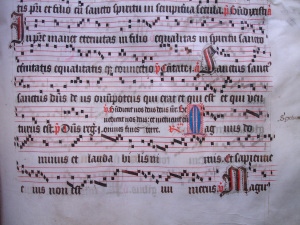Often one tries to define the secret of the eve growing interest in the “Gregorian Festival of Watou”. This interest is, of course, first of all due to the theme itself: “Gregorian chant”.

Gregorian chant is the most honest form of music one can imagine. This chant gives you beneficent rest, even if one does not understand Latin. Gregorian chant is universal, fifteen centuries old and still up-to-date in various cultures. This is due to the fact that this music speaks to everybody’s heart, be it about joy, love, concern, acquiescence, anxiety, hope or confidence. Gregorian chant is the wavelength of the heart, not expressed in analog or digital frequencies. It feeds the hunger for deeper spirituality and inner life.
Gregorian chant is the voice of silence. It is not a purely musical phenomenon, it has something fascinating. It is mysterious and even mystical. Thanks to its deep spirituality and its inner life Gregorian chant responds to the urge for mental deepening. For many people this chant is an echo of eternity. The melodies show up an inner, elusive beauty and are, so to speak, the musical icons of the text. Text and music form a real symbiosis.
As a liturgical chant Gregorian chant contains everything: it is sensual, it loves silence, it does not ask for explanation and it has a strong mystical power. Holiness and beauty are perfectly integrated in a way that allows defining it as a fresco, a mosaic or an icon, a reference to the Eternal Beauty.
Watou on the waves of the musicological revival of gregorian chant
From a musicological viewpoint Gregorian chant is gaining ground. Most choirs which will be participating are professional or semi-professional ensembles formed at musical institutions. Twenty of them are professional ensembles, or are at home in conservatoria and music centers. This raises the global musical level considerably.
The Gregorian repertoire may be “centuries old”, singing and listening to it is surprisingly young. On the one hand people in Belgium and abroad are rediscovering the meditative power and the sublimity of Gregorian chant. On the other hand the quality of the ensembles on both amateur and professional level is heightening rapidly and constantly. In numerous institutions the analysis and study of the old manuscripts is intense. The result of this research is then applied in the choir practice of numerous new ensembles who practice Gregorian chant and early polyphony.
The organizers of the Festival are attentive to both these phenomena and they have started an international meeting and presentation forum where these musicological fruits and the new interpretive approach can be presented to the general public. In this way the International Festival of Watou has gained a special position which is unequaled in any other place.
